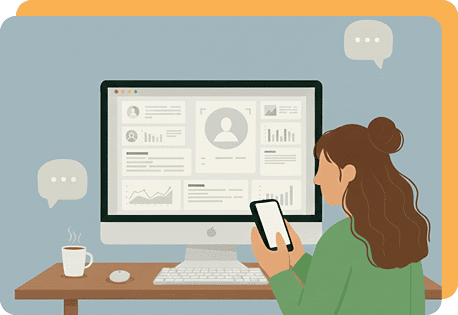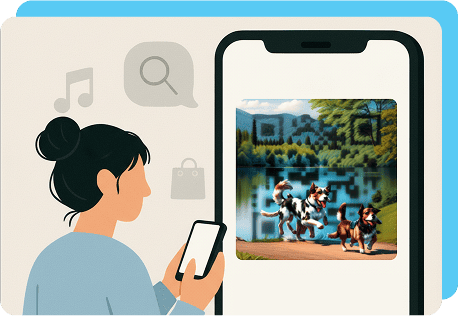What Are the Risks With QR Codes?
QR codes can be misused in different ways by people who want to access your details or process payments fraudulently:
| Common QR Code Scams | How It Works |
|---|---|
| QR code phishing | Redirects you to fake login pages |
| QR code malware | Prompts downloads that infect your device |
| Data harvesting | Tracks your location or device info without consent |
| Financial fraud | Sends payments to scammers instead of trusted vendors |
These threats usually hide behind urgency, such as:
Scan the QR code to claim your prize or time-limited offer
Can a QR code steal your information?
A QR code alone cannot steal your data. It’s simply a tool that stores a link.
The problem lies in where that link takes you:
- Fake websites that look like real ones
- Malicious apps that download in the background
- Forms designed to steal your login or banking details
This is why you should never scan a random QR code, especially from a source you don’t know or trust.
Real Cases: Can QR Codes Be Hacked?
No, technically, the code itself can’t be hacked once printed — but a hacker can generate a dangerous QR code that looks legitimate. There are examples of fraudulent uses of QR codes from all over the world.
In Texas, scammers put QR codes on parking meters to trick people into thinking they were an easy way to pay. Assuming they were authentic, victims scanned and made payments directly to the criminals.
QR scams can also compromise data security. In Switzerland, fake QR codes were sent by mail and led people to download malware that stole their personal details.
Similarly, in the U.S., hackers have used QR codes to try to steal private information from an energy company.
These real attacks show that QR codes are being actively used in scams. That’s why learning how to avoid QR code scams is highly recommended.
How to Identify a Fake QR Code
Scammers often print a fake QR code and stick it over a real one in public places. You can avoid this by checking:
- Is the code a sticker? Does it look out of place?
- Is there branding or context? A QR on a blank sheet is suspicious
- Is the source trustworthy? Don't scan codes from strangers
- Does the link preview look legit? Watch for spelling errors or odd URLs
- Is it pressuring you to act fast or win something?
Check your QR codes safely with OnlineQRcode — preview links, verify destinations, and create secure codes.
Create your secure QR code now
How to verify QR code safety
Learn how to check if a QR code is safe by following the best practices below. It only takes a second to protect your data.
Use a safe QR code checker tool
Tools like Kaspersky QR Scanner that let you preview the link before opening it. This means you won’t be directed anywhere unexpected.
Stick to trusted scanner apps
To avoid QR code scams, use your phone’s default camera or reliable apps like Norton Snap instead of random QR readers. Known scams may even be flagged by your phone.
Look for the full URL
Choose apps or browsers that display the full link after scanning. Chrome on Android shows the full URL before opening the page, so you can check if it looks legit.
Never enter sensitive information
To protect yourself from QR code scams, never enter passwords or payment details unless you’re sure the site is official, like your bank’s domain.
Scan from trusted sources only
The best practice is to only scan QR codes from known brands, printed materials like official packaging, or store signage. Avoid scanning random stickers in public.

What to Do If You Scanned a Fake QR Code
If you think you scanned a malicious QR code, take action right away:
Knowing what to do if you scanned a fake QR code could limit the damage and stop any fraudulent activity. Act quickly and alert your local cybercrime authorities.
Is it Safe to Create Your Own QR Code?
If you're using QR codes in marketing, events, or customer support, security matters.The best way to avoid issues is to learn how to protect yourself from QR code scams, so you can make safe and easy to use codes.
This can also help you educate your customers on safe QR code scanning practices. So your QR is easily recognizable, use your brand logo and colors.
If you want to link to other sites, make sure to only share domains that you trust. It’s tempting to use link shorteners to make your QR code more visually appealing, but this makes it difficult for users to see where they’re being directed.
OnlineQRcode: Your trusted QR tool
Creating safe, branded, and reliable QR codes is easy with our secure QR code generator.
Here’s what makes our tool different:
- We don’t collect personal data from your users.
- All links are encrypted with HTTPS.
- Our generator does not embed tracking scripts.
- You can brand your QR codes with logos and colors.
- Our QR codes are tested for mobile optimization.
- We provide usage insights without compromising privacy.
The OnlineQRcode platform was created with in-built encryption features to protect all the data processed by our users.
We adhere to the strictest legal standards to protect you and your customers. This includes full compliance with FTC and EU data security regulations. We commit to total data protection and never share personal information.
Want full control over your QR experience? Use a OnlineQRcode’s generator that prioritizes safety from start to finish.







